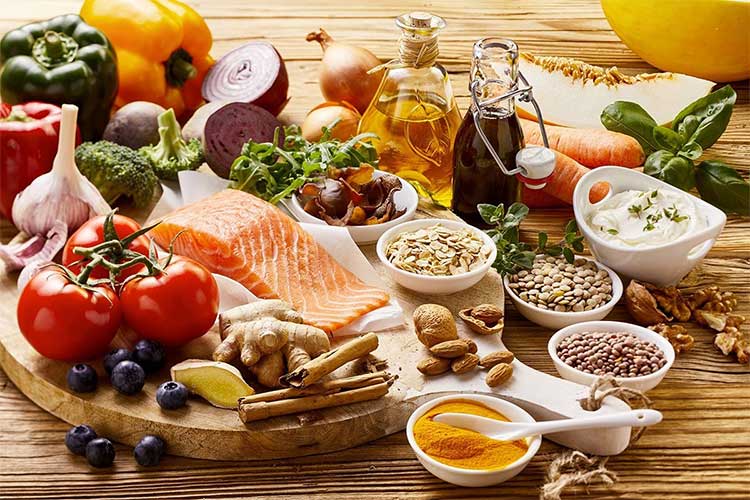One more type of food helps to prevent insomnia
New US research found that if you eat a lack of certain vitamins and minerals, you can lose sleep and have poor sleep quality.
A work based on a large dataset of the US National Health and Nutrition Examination (NHANES) program found a clear link between a person's sleep quality and some vitamins and certain minerals.
Presented at the ongoing American Nutrition Association meeting in Baltimore, the authors from Pharmavite LLC and Nutrition Impact LLC reported that people who slept less than 7 hours per night consumed vitamins A, D, and B1. .; minerals like magnesium, niacin, calcium, zinc, phosphorus . and fiber are lower than those who get enough sleep.

Meals with a variety of fresh and delicious food sources, many vitamins and minerals will help you improve sleep quality, resist insomnia - (illustrations from the internet).
According to the lead author Chioma Ikonte, not only sleep less, but those who consume the same vitamins and minerals also have poor sleep quality. Specifically, 32.7% of them have short sleeps, quickly wake up; 47.3% had poor sleep quality; 37.9% slept late; 15.1% had sleeplessness, 8.94% of sleep disorders, 9.3% had to use sleeping pills and 27.7% said they had "problems with sleep".
There is no solid evidence that lack of sleep causes a lack of nutrients or a lack of nutrients that cause insomnia, or two-sided effects. However, scientists have tried for people with insomnia, lack of sleep to supplement these substances and their sleep quality has obviously improved.
The good news is that if you live in a sunny area, rich flora and fauna, the supply of these nutrients is not lacking. For example, vitamin A is rich in red and orange vegetables and fruits; Vitamin D is synthesized when you are in the sun, many in marine fish, milk and soy milk, orange juice, eggs .; Vitamin B1 is rich in rice and grains, red meat, liver, eggs, beans, seeds .; zinc is abundant in meat, seafood, beans, nuts, milk, eggs .; rich niacin in liver, chicken breast, salmon, tuna .; magnesium is rich in whole grains, spinach, nuts . If for some reason you can't eat enough vitamins / micronutrients, you should think about supplements.
- Smart pillow Dreampad helps prevent insomnia
- Insomnia is caused by genes?
- Very simple remedy cures chronic insomnia
- How to lose sleep?
- Dealing with insomnia?
- Miraculous food prevents cancer, high blood pressure
- The cure for insomnia is much simpler than we thought
- Inventing starch helps prevent obesity
- Cure insomnia with acupressure
- Eating eggs regularly helps prevent diabetes
- USA: Invention of food poison test strips
- Food helps to sleep every night
 13 causes of non-itchy rash
13 causes of non-itchy rash How the mouse with human ears changed the world?
How the mouse with human ears changed the world? The truth about 'fried rice syndrome!
The truth about 'fried rice syndrome! What is dental implant?
What is dental implant? Why do women sleep less and wake up more than men?
Why do women sleep less and wake up more than men?  Top 5 extremely common habits before bed, seemingly normal but have unexpected harmful effects
Top 5 extremely common habits before bed, seemingly normal but have unexpected harmful effects  Strange woman who hasn't slept for... 40 years
Strange woman who hasn't slept for... 40 years  Why does the sound of running water help us sleep better?
Why does the sound of running water help us sleep better?  Discover the political factor that keeps you up at night
Discover the political factor that keeps you up at night  Seemingly harmless habits that ruin your sleep
Seemingly harmless habits that ruin your sleep 